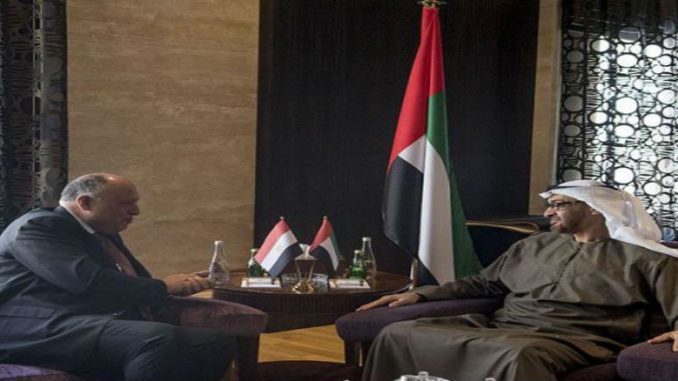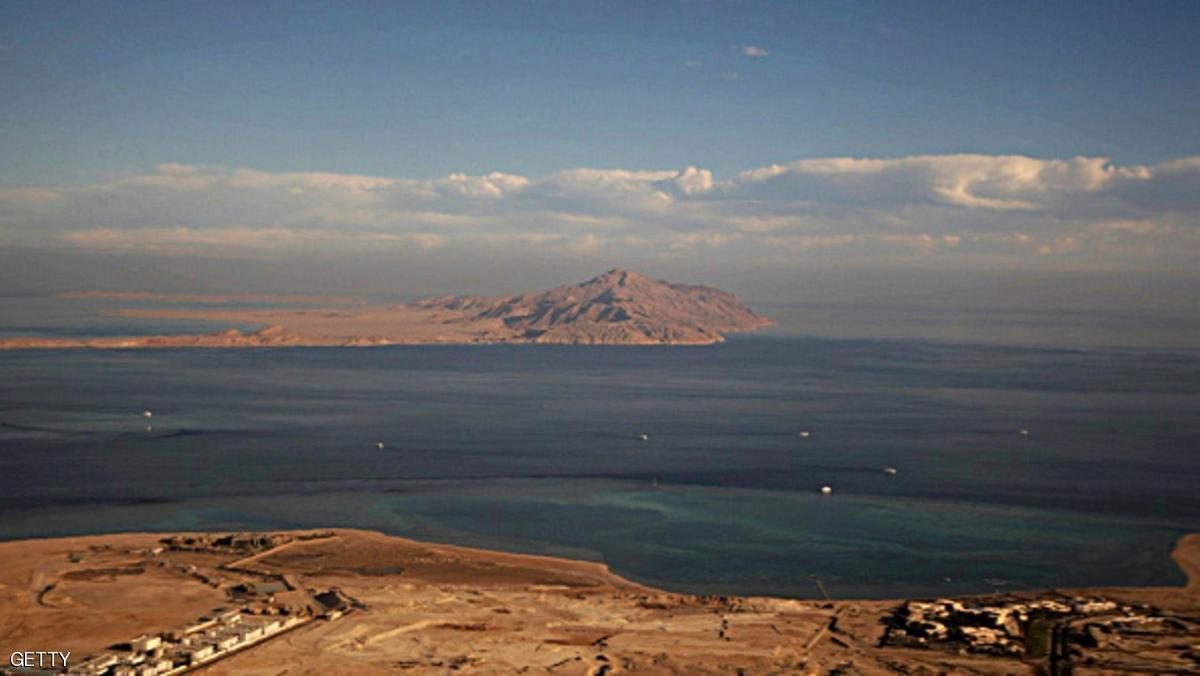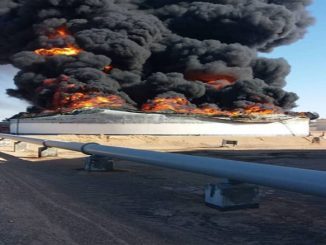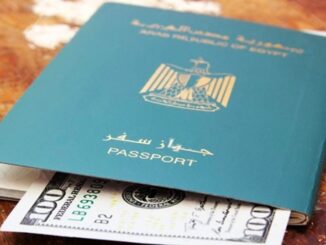
Egypt’s Foreign Minister visited the United Arab Emirates on Saturday and met with Crown Prince of Abu Dhabi and Deputy Supreme Commander of the UAE Armed Forces, Sheikh Mohamed bin Zayed Al Nahyan where they discussed ways to strengthen the close relations between the two Arab countries.
During the visit, Shoukry conveyed a verbal message from Abdel Fattah al-Sisi to Sheikh Khalifa bin Zayed Al Nahyan. Shoukry also met with the United Arab Emirate’s (UAE) Foreign Minister Abdullah bin Zayed al-Nahyan where they agreed to establish a bilateral political consultation mechanism with meetings to be held every six months, according to al-Ahram, an Egyptian state-owned newspaper.
Egypt’s foreign ministry spokesman Ahmed Abu Zeid state in an official statement that the decision comes following an Abu Dhabi meeting that witnessed talks about ongoing regional developments and international conflicts of common interest.
In addition, the two officials discussed bilateral relations in different fields, and methods of developing them to be extended to aspects that serve the interests of the countries.
The meeting also saw both sides agree on their visions regarding the importance of reaching political solutions for crises in several countries in the region, including Yemen, Syria, and Libya.
They also agreed that the need to implement fast procedures to face dangers that threaten Arab national security, which call for joint efforts to bolster Arab unity to face it, especially in issues related to combating terrorism and extremism.
Furthermore, the UAE official told Shoukry that his country reiterates its support to Egypt economically and politically.
The minister said that the UAE continues to support the Egyptian people’s right to development, stability, and growth, explaining that Egypt is considered a pillar of stability in the Middle East due to its strategic and security impact, which doubles the importance of supporting it in this “distinguishing period.”
In addition, the Emirati official said that the UAE is keen to strengthen its ties with Egypt in different fields, pointing out what Egypt possesses in terms of economic potential as well as executing and attracting investment strategies to help its economy.
In return, Shoukry praised relations between the two countries, affirming Egypt’s deep appreciation for the UAE’s supportive stance, and also pointed out that Egyptian-UAE relations are a model for inter-Arab world relations.
The relations between both countries have strengthened as UAE has provided unlimited support to the al-Sisi regime to face the pro-democracy political forces, including the Muslim Brotherhood and President Mohamed Morsi supporters.
The UAE also provided Egypt with billions of dollars as a financial aid to rescue Egypt’s economy.
In August 2016, UAE has agreed to pour Egypt’s central bank with a $1bn deposit for a duration of six years.
In this context, Emirates News Agency stated at that time that the $1bn deposit, which is for a six-year period, comes as part of the UAE’s “unwavering position in supporting Egypt and its people” and in recognition of Egypt’s “pivotal role in the region.”
In addition, UAE has allocated $4bn in April to support Egypt -$2bn in investment and another $2bn to be deposited at the central bank to support foreign exchange reserves.
Moreover, Egypt’s al-Sisi and UAE share common interests and agendas related several issues in the region, especially in Libya as both countries provide strong support to Libya’s strongman General Khalifa Haftar.
Haftar is a military figure that is backed by the Tobruk government, based in eastern Libya and refuses to recognize the U.N.-backed government.
Media reports claimed that Egypt and UAE have provided military support to Haftar to extend his control over the oil crescent region in Libya.
The Libyan National Army (LNA) led by Haftar had taken over oil facilities in eastern Libya from Petroleum Facilities Guards, a rival militia force allied to the UN-backed government in the capital, Tripoli.
Days later, the Petroleum Facilities Guards(PFG) have regained control over Ras Lanuf oil terminal and the Gulf of Sidra after confrontations with the Libyan National Army(LNA).
However, they have withdrawn from the Oil Crescent region in east Libya, hours after retaking Sidra and Ras Lanuf oil terminals from Haftar’s militias last September.
Local media reported that the “PFG accused Egypt and the UAE of bombing their forces near the residential district of Ras Lanuf. Four PFG fighters were killed in the airstrikes,” according to Libya Observer.
The Defense Ministry in the UN-backed government indicated that “foreign warplanes have played a key role in defeating PFG forces.”
The Defense Minister-designate Al-Mahdi Al-Baraghati told Ajwa Net that “There are strong indications that the UAE and Egyptian warplanes bombed PFG forces in Ras Lanuf and Sidra, we are now making sure of these indications.”
In the same context, last November, the New Arab reported that a Libyan military official formerly affiliated to Khalifa Haftar confirmed that the UAE now maintains a military base that supports the operations of the general in eastern Libya. The base is located south of the city of al-Marj on the site of an old airstrip in a region known as al-Sulaiyah, the source said.
The source added that Haftar’s Emirati allies want to maintain a presence on Libyan territory in order to act in support of his military operations and to protect his main base in al-Marj.
Also, Libya Express reported that the UAE has established a military base in eastern Libya in support for the Operation Dignity Forces, led by Khalifa Haftar.
The UAE-staffed military base in eastern Al-Marj city is the place from where Haftar’s forces together with UAE troops is operating AT-802 light attack aircraft and unmanned aerial vehicles (UAVs), Airbus Defense and Space satellite imagery as obtained by IHS Jane’s shows, according to Libya Express.
IHS Jane’s revealed that Al-Khadim Airport is in Al-Marj province around 100 km from Benghazi, where the UAE aircraft are supporting Haftar’s militias.
However, Ahmed Aboud, the political adviser to the Chairman of the House of Representatives in Tobruk denied at that time the report published by “IHS Jane’s” that affirmed the presence of an Emirati military air base in eastern Libya. On the other hand, the High Council of the Libyan State considered the report of ‘Jane’s’ as an evidence of the existence of the base and described it as an Emirati violation of the Libyan sovereignty, according to Al-Jazeera.



